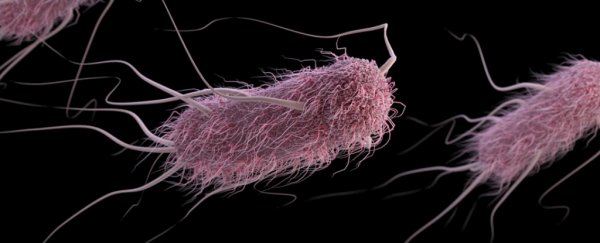New research shows that our bodies own immune systems have another way to fight off urinary tract infections (UTIs) without antibiotics - and it's super effective.
This is a pretty big deal, seeing as UTIs are one of the most common infections treated with antibiotics in humans – something that's contributing to the rise of drug-resistant superbugs.
Right now, bacteria in the US are readily becoming resistant to our last lines of antibiotics, hospital infections are getting more and more deadly, and even gonorrhoea is on the verge of being untreatable in the near future.
So finding anything that can treat bacterial infections without antibiotics is incredibly exciting for scientists.
UTIs are usually caused by E. coli (Escherichia coli) or other bacteria entering the urinary tract and attaching to the cell wall of the bladder, urethra, or kidneys (with kidney infections being the most severe).
Researchers already know that the bladder has a bunch of defence mechanisms it uses to try and minimise infection. One of these involves the lining of the bladder shedding frequently, so any bacteria that attach get washed out.
But that doesn't work in all cases, and if E. coli does manage to attach to the bladder wall, the resulting infection can be painful, and unpleasant – especially if antibiotics aren't able to clear it. There are currently 8.1 million doctors' visits annually in the US just as a result of UTIs.
But now Duke University researchers have shown in detail for the first time a pathways through which bladder cells can actually kick out the bacteria that cause UTIs – and are now looking into how they can harness it to treat the infections without antibiotics.
"We found that the process which cells use to secrete chemicals also appears to be the way to clear urinary tract infections," said Yuxuan Phoenix Miao, one of the researchers, in an interview with ResearchGate.
"Bacterial pathogens hide within a membranous vesicle in the bladder cells," said Miao. "We revealed that a protein complex important for secreting hormones called 'Exocyst' can precisely recognise and locate bacteria hiding in those vesicles, then promote transport of these bacteria-laden vesicles towards the cell surface, and throw the bacteria out of the bladder cell."
Even cooler, bladder cells can tag those vesicles with bacteria inside, so the immune system can remove the offending bacteria.
To do that, the immune system usually sends in lysosomes – organelles that eat and break down virtually anything in a cell, including bacteria. But occasionally the bacteria manage to survive this process, and when a lysosome eventually bursts, the freed bacteria go back and re-infect the cell.
But last year the same researchers also discovered that lysosomes can detect if the bacteria they've eaten isn't breaking down, and vomit up the offending bacteria – which means they can be cleared away by other parts of the immune system.
"It was thought that lysosomes always degrade their contents," Miao said last year. "Here we are showing for the first time that when the contents cannot be degraded, the lysosome appears to have a back-up plan which is to expel the contents in capsules."
So, in other words, the team has shown in detail how our cells have the ability to clear even the most stubborn of bacteria – which means they can look for ways to tweak the process to make sure it happens more regularly, and on demand.
The researchers are now looking into current medicines and other substances to see if they can trigger this natural clearing mechanism with more accuracy and control. The plant extract Forskolin is currently a possible candidate for testing.
"Previous studies from our lab have found that Forskolin can dramatically enhance the bacteria clearance effect by promoting the bacteria export process," said Miao. "Now that we have identified the pathway which the bladder cells use to export bacteria, we can start to examine whether Forskolin enhances bacteria expulsion by promoting the function of the Exocyst and if so, how."
Just another reason your immune system is amazing. And if we manage to get rid of UTIs because of it, I won't be complaining.
The research was published in Immunity.
